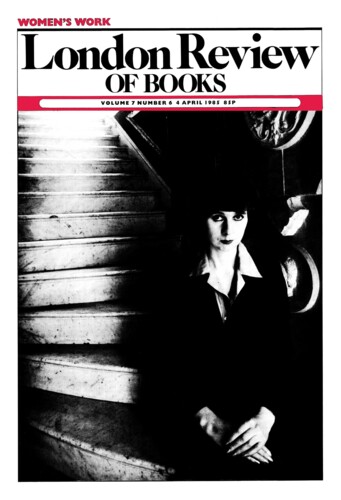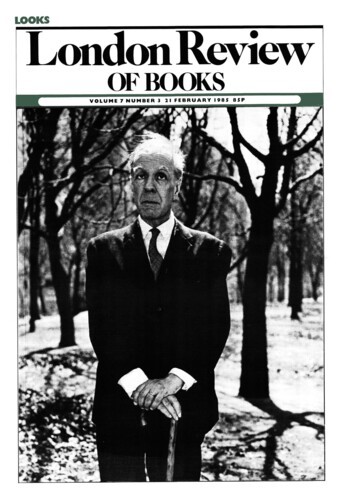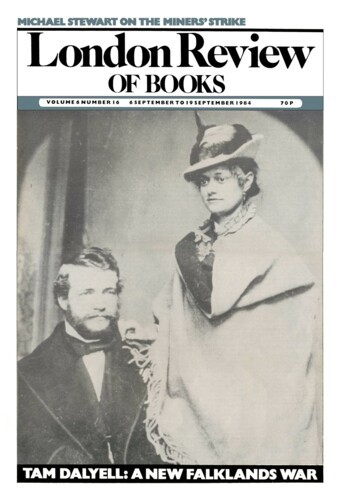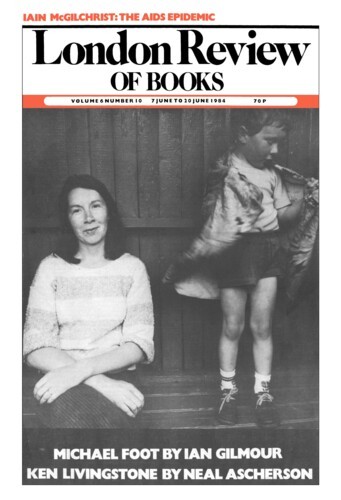Tom Paulin
Tom Paulin is a poet and critic.
The Case for Geoffrey Hill
Tom Paulin, 4 April 1985
Geoffrey Hill’s second collection of poems, King Log, was published in 1968, that year of student radicalism and disappointment. Hill’s title is reactionary in its implications and derives from Aesop’s fable of the frogs who desired a king. In my edition of L’Estrange’s royalist version of Aesop the fable runs like this:
Poem: ‘At Mill with Slaves’
Tom Paulin, 21 February 1985
‘For me the crown is the symbol of the unity of the tribe.’
Ted Hughes
St nissan mishan biskit bingo hut an skwidbone strand win me sunday fraym fotograf av momma kween. But me not want dis woolworting no lang no mor. Giv to Iron Man. He coom up dis rainrain day fram gravul pit pleec frogmen liv – wit mistultoes astrologee an beeds av glass dis kweenwite fotograf he giv...
Two Poems
Tom Paulin, 6 September 1984
All my mates were out of town that lunk July and though we shared a bed still it was over – she’d paid the rent till August first so each bum hour those rooms threw back at me this boxed-up, gummy warmth like a pollack’s head and eye wedged in an ironstone wall.
Most every day she’d paint in the loft above the stables while I wandered right...
The Road to Sligo
7 June 1984
Pieces about Tom Paulin in the LRB
Reports from the Not Too Distant Canon
Frank Kermode, 23 May 2002
This book is a sequence or collection of poems and other things concerning events in Europe in the period between the Treaty of Versailles and, broadly speaking, the Battle of Britain. Some of...
Shoe-Contemplative: Hazlitt
David Bromwich, 18 June 1998
How they keep trying to bury Hazlitt, and how he keeps coming back. T.S. Eliot said he was guilty of ‘crimes against taste’. David Lodge made him a twee subject of nostalgic research...
Sevenyearson
Michael Hofmann, 22 September 1994
Everybody knows – Paul Muldoon said it on the radio recently – that writing poetry can only get harder the more you keep at it. Against that is the belief, or perhaps the...
Paulin’s People
Edward Said, 9 April 1992
It is not very often that professional students of literature experience an invigorating shock of pleasure, surprise, illumination upon reading a work of criticism – perhaps because, like...
Umpteens
Christopher Ricks, 22 November 1990
Adrian Room has garnered umpteen dedications, and some of them are of interest, but what is the point of unrolling them alphabetically as something purporting to be a dictionary? Abbott opens,...
Public Works
David Norbrook, 5 June 1986
‘Arnold and Eliot ensured that the magic of monarchy and superstition permeated English literary criticism and education like a syrupy drug ... ’ Yes, this is Tom Paulin speaking....
Local Heroes
John Horgan, 7 February 1985
In the 1840s, according to Theodore Hoppen’s densely-packed and illuminating study of Irish political realities, ‘bored’ British ministers ‘grappled with the tedious but...
Making sense
Denis Donoghue, 4 October 1984
In ‘A Wave’, the title-poem of his new collection, John Ashbery says, among many other things: One idea is enough to organise a life and project it Into unusual but viable forms, but...
Accessibility
Derek Mahon, 5 June 1980
It would be disingenuous of me to pretend that I have taken the full measure, or anything like it, of Middleton’s Carminalenia, an intensely difficult collection about as far removed from...
Read anywhere with the London Review of Books app, available now from the App Store for Apple devices, Google Play for Android devices and Amazon for your Kindle Fire.
Sign up to our newsletter
For highlights from the latest issue, our archive and the blog, as well as news, events and exclusive promotions.




